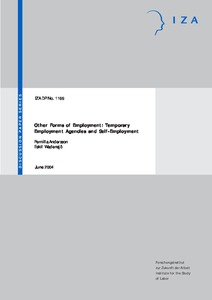Other forms of employment: temporary employment agencies and self-employment.

Wadensjö, Eskil ; Andersson Joona, Pernilla
Institute of Labor Economics, Bonn
IZA - Bonn
2004
31 p.
self employment ; temporary employment
Discussion Paper Series
1166
Employment
English
Bibliogr.
"In most industrialized countries the majority of employed people are full-time employees with a non-temporary job and work at a workplace of the company in which they are employed. They are making careers at the employer they are employed by and most work-place changes are to other jobs of the same type. But it does not include large groups in the labour market. Many of those who have tenured positions work part-time, not full-time, and many both full-time and part-time workers have fixed-period contracts, contracts which only guarantee employment for a specified period of time. Some demographic groups are overrepresented among those with those types of jobs, young people, women, immigrants, ethnic minorities, and older workers, who to a large extent for different reasons do not have a very strong position in the labour market. In this paper two groups outside the core of full-time employees are analyzed: those employed in temporary employment agencies, and the selfemployed. The size and composition of both groups have changed during the last decade. The number employed by temporary employment agencies has increased in Western Europe as a consequence of deregulation of this sector in the 1990s, and the composition of the selfemployed has changed from mainly being farmers to being business-owners in various sectors. We will use Sweden as an example, but the Swedish experience is not unique. Other countries have similar and in many cases more of those types of employment."
Digital
The ETUI is co-funded by the European Union. Views and opinions expressed are however those of the author(s) only and do not necessarily reflect those of the European Union or the ETUI.